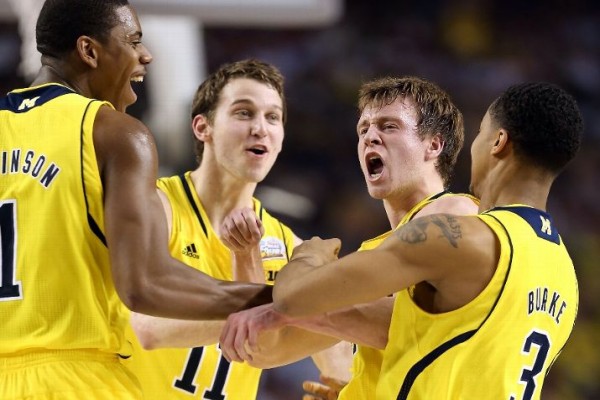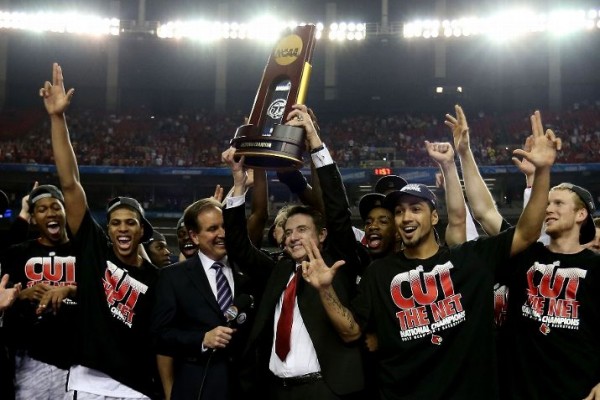Look at That: Michigan-Louisville Saved a “Terrible” College Basketball Season
Posted by Chris Johnson on April 9th, 2013Chris Johnson is an RTC Columnist. He can be reached @ChrisDJohnsonn.
Conclusions are designed to summarize. They are added on the ends of books to pithily sum the events of previous chapters. They tie together loose ends, pull things together. Everything falls in line, any earlier doubts crystallized into a clear and concise synopsis. Everything makes sense. When it doesn’t – that’s when you question, when you wonder, when you’re truly flabbergasted by the events unfolding in front of you.
That was the feeling I got Monday night watching one of the most insane first half performances of any national championship game in any season in any level of competitive basketball. Spike Albrecht blew my mind. Yours, too: In the matter of 16 minutes, Albrecht – called into action after National Player Of The Year Award-gathering point guard Trey Burke picked up a sketchy second foul – scored 17 points on 6-of-7 shooting and 4-of-4 from beyond the arc. He entered the game at a precarious time for Michigan, what with their floor leader and undisputed best player sent to the bench, and when he left, Albrecht was a legend.

An enormous burst of energy from Albrecht gave michigan a huge jolt in the first half (Getty Images).
It didn’t stop there. Louisville responded – check that. National semifinal hero Luke Hancock responded with a ridiculous four threes on four consecutive possessions, all launched from the same general right-wing location, each purer than the one preceding. At the end of 20 minutes, two teams went to the locker room separated by one point. It was one half of basketball, and the nation had already enjoyed quite enough excitement for one night – more excitement than this college basketball season, this no-dominant-team, down-tempo, micromanaged, low-standard-of-play, bring-back-the-good-old-days season provided over five months of games.
——————–
The running theme in college hoops circles these days goes a little something like this: The sport is irredeemably destroyed, all the way down to its most basic components – team unity, player motivation, coaching greed and, my personal favorite, parity. As if a relatively equal playing field, and a complementary absence of a Kentucky 2012-level alpha dog, is such a bad thing. As if competitive basketball between two evenly-matched outfits on national television in an arena packed 75,000-strong is a detestable element of the game we’ve come to accept, a sign of deteriorating talent and viewability?
There were weekly changes atop the AP and Coaches Polls; that’s because no team is good or consistent enough to keep the number one spot. There were games being played in the 30s and 40s, winners and losers alike; that’s because all of this predictable high-ball screen stuff is painful to watch and ruining the game and erasing that alluring laissez faire offensive flair. There were casual complaints from NBA fans about a truly weak prospective lottery selection; that’s because the one-and-done system is sucking the sport dry of all its best talent. I’ll stop there.
College basketball had truly fallen off the rails, so was the word. It had reached unprecedented depths from whence it could never return. From the roster turnover to conference realignment to (gasp!) a constancy of fluidity at the top of the polls – what happened to the game we loved? Where did it all go wrong?
——————–
The second half commenced, impossibly tasked with reprising the drama that played out over the first 20 minutes. It didn’t come close. Don’t get it twisted: there was plenty of drama in the second period, but it was something closer to a normal college hoops game. It featured a few mind-blowingly bad calls – Trey Burke’s clean block with just over five minutes remaining was, well, spotless – to go along with a bunch of weird late-game coaching decisions, John Beilein’s decision to leave Burke in the game when his team needed a late foul chief among them.
But the game kept you buzzing until the very end. Louisville’s victory parade wasn’t completely locked down until Hancock buried two free throws with 30 seconds to go. Everything right up until then was excellent – it was college basketball just the way we like it. Fun, uptempo, riveting, storylines-abounding, SPIKE ALBRECHT SCORING 17 POINTS, Hancock calmly sealing a national championship at the free throw line while privately combating the emotional weight of his gravely-ill father.
If this is the game that needs fundamental repairs, that needs an infusion of talent and a revised NBA age limit, that needs faster and more ambitious coaches, that needs to excise all those annoying late-game timeouts and stupid block-charge concepts, then I’ll have another hearty serving. College basketball doesn’t get any better than what you saw Monday night, particularly in the first half. All of the various warts I’ve made sure to emphasize in the preceding paragraphs are totally and completely true: We can use some changes. There is something financially and ethically wrong about one-and-done. Referees make mistakes. Coaches overcoach. Blah blah blah.
Those criticisms are well-noted and measurably indisputable. And if that was all college basketball had to offer – broken rules and truly repulsive hoop – then the conclusion of the 2012-13 season would have been an astonishing turn of events. The thing is, all the high-strung brilliance of Albrecht and Hancock and Burke and everything else that made Monday night one of the best championship games in recent memory, was there all along. You just had to look a little harder. It was easy to dismiss for much of the season, to point out the inconsistencies and existential flaws instead, but if you dig a little deeper, if you just give it a chance, take the good with the bad, college basketball delivers.
It came to pass that Spike Albrecht scored 17 points in 16 minutes, and he wasn’t even the biggest story of the night. But yeah, college basketball is unbearable. Just tell me what I’m missing.














































